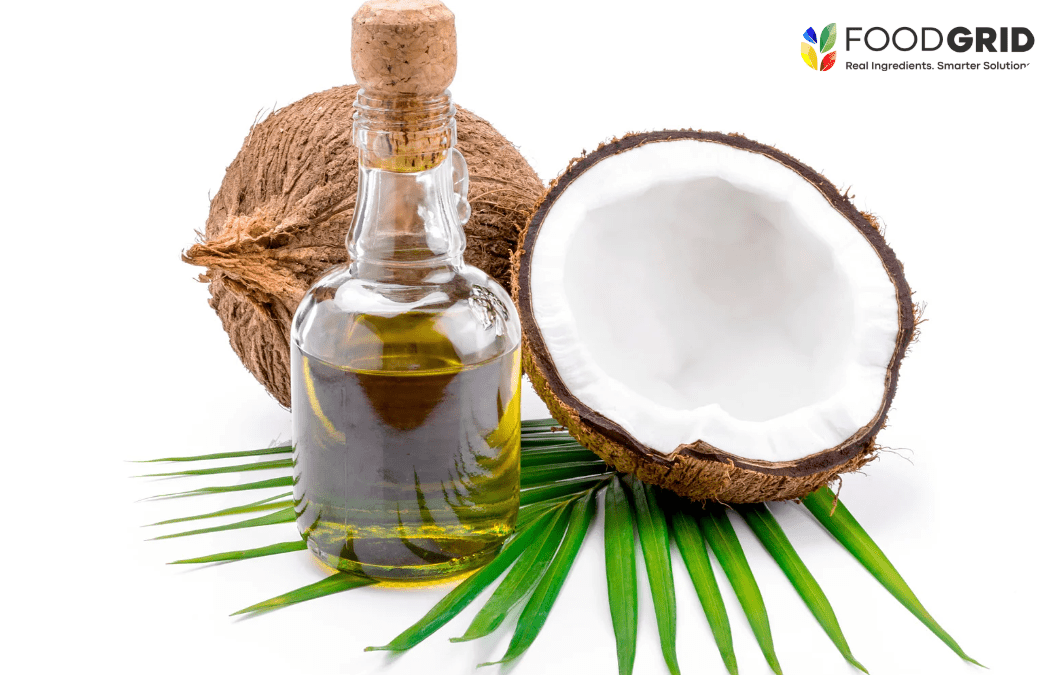As producers ramp up for volume production—whether seasonal peaks, product line extensions, or continuous mass output—the ingredient choices you make matter not just for flavor but for scalability, reliability, and texture. Among fats and oils, coconut oil is emerging as a star performer for high-volume food production. Below, we explore why.
Why Coconut Oil Works at Scale
- Consistent Functional Performance
Coconut oil has a distinctive fatty acid profile (rich in saturated medium-chain triglycerides such as lauric acid) that gives it reliable solidification behavior, controlled melting, and strong crystallization properties. This consistency means you can scale formulations with fewer surprises.
For high-volume operations, consistency across every batch is key—coconut oil helps deliver that.
- Texture Enhancement
Large-scale baked goods, confectionery coatings, and enrobed products often suffer when fats vary in melting point or crystallization behavior. Coconut oil helps:
- In laminates and pastry doughs, the solid fats trap and release steam to create flakiness and crisp layers.
- In chocolate or compound coatings: It gives a firm “snap” and a clean melt in the mouth, supporting high-volume coating lines that demand speed and uniformity.
- In soft baked goods: Good aeration and moisture retention lead to tender crumb structures—valuable when you’re making thousands, even millions, of units.
- Shelf Stability & Waste Reduction
In high-volume production, waste due to variation, spoilage, or off-texture is costly. Coconut oil helps here too:
- Its saturated nature makes it more oxidation-resistant than many unsaturated oils used for similar applications.
- It can help extend shelf life by reducing spoilage or texture degradation over time (important if your distribution network spans long supply chains).
- Uniform crystallization and setting in large batches reduce the risk of product rejects due to fat migration, bloom, or fat-phase separation.
- Clean Label & Consumer Perception
Consumers increasingly demand simple, recognizable ingredients. “Coconut oil” carries a cleaner image compared to some synthetic or highly hydrogenated fats. This is a bonus when scaling product lines and wanting differentiation.
From a production perspective, that means less risk of reformulation downstream and better alignment with marketing claims.
- Process Efficiency
When you’re producing at scale, even small improvements in process efficiency add up quickly. Benefits of coconut oil include:
- Predictable setting and crystallization behavior reduce bottlenecks in production lines (for example, enrobing, cooling tunnels).
- High smoke point and thermal stability (for certain refined grades) enable higher-temperature operations without compromising quality.
- Versatility across applications (baking, coatings, frying) means fewer SKUs of fat/fat blends to manage—simplifying supply chain and inventory management.

Real-World Applications for High-Volume Production
Baking Lines
Imagine a facility producing millions of cookies, biscuits, or layered pastries monthly. Using coconut oil as the primary fat enables the producer to:
- Ensure crisp bites and stable textures across batches—consumers expect the same crunch every time.
- Simplify fat handling since coconut oil solidifies at room temperature but melts cleanly during baking, supporting uniform layering and steam expansion.
- Maintain product quality during long runs and across shifts, with less variation in mix behavior.
Confectionery & Coating Lines
In large-scale chocolate bar, truffle, or enrobed cookie operations:
- Coconut oil helps the coating set firmly with a pleasing snap, and melt at body temperature—not stay waxy.
- It supports efficient cooling and tempering sequences, enabling smoother production flow and fewer rejects due to bloom or fat-phase segregation.
- Its clean melt and neutral or controlled flavor (in refined grades) make it suitable for mass production of seasonal or premium confectionery lines.
Ready Meals / Snack Frying
For fried snack producers and ready-meal operations:
- Refined coconut oil’s thermal stability and high smoke point allow robust frying with fewer off-flavors and better oil life.
- It supports better control of oil degradation, reducing downtime for oil changeover, and thereby boosting line uptime.
Considerations for Scaling Up
While coconut oil offers many benefits for high-volume production, producers should account for a few practical factors:
- Supply and Cost: Reliable sourcing is critical. Some grades may cost more or face supply constraints—especially if premium (virgin) grades are selected.
- Formulation Compatibility: Although coconut oil is versatile, you may need to adjust other fat ratios, emulsifiers, or process parameters when switching from other fat sources.
- Storage and Handling: Because coconut oil solidifies at ~24-27 °C (depending on grade) in cooler climates, it may require temperature control for pumping. The solid-to-liquid transition needs to be managed in your plant.
- Regulatory & Labeling: If your market emphasizes saturated fat intake, you’ll want to ensure your nutritional labeling remains compliant and that coconut oil use aligns with your product positioning.
- Performance Testing: Before mass roll-out, test at full-scale batch conditions to confirm crystallization behavior, cooling set times, shelf life, and compatibility with your packaging and distribution environment.
Summary: Why Embrace Coconut Oil for High-Volume Production
When you’re scaling food production—whether for baked goods, confectionery, snacks, or ready meals—your fat system is one of the major levers controlling quality, process efficiency, and consistency. Coconut oil offers a compelling combination of:
- Reliable and reproducible functional performance
- Enhanced textures (crispness, flakiness, snap, tender crumb)
- Improved shelf stability and waste reduction
- Cleaner label appeal and ingredient elegance
- Process efficiency gains in handling, setting, and frying
Ready to perfect your festive textures? Contact FoodGrid today for a custom formulation consultation and a bulk quote for your Q4 Coconut Oil needs!
